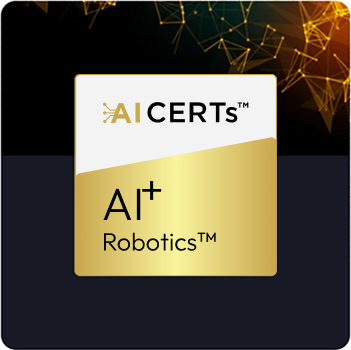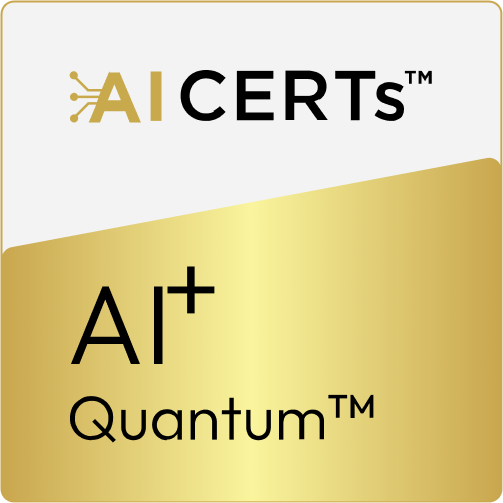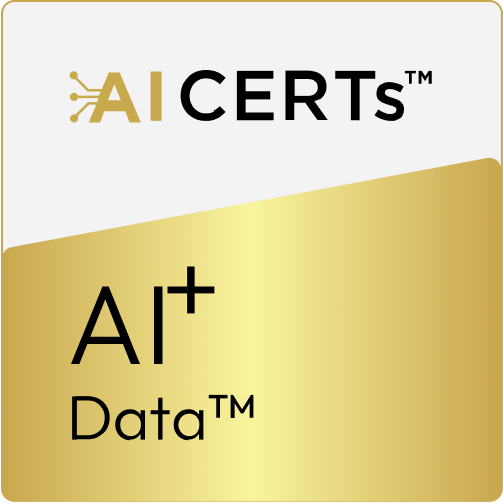AI+Robotics™
# AT-420
Build the Future with Smart Automation
- AI-Driven Robotics: Apply AI in Deep Learning, Reinforcement Learning, and smart automation
- Real-World Systems: Work with autonomous systems and intelligent agents
- Ethics & Innovation: Learn industry-aligned practices and innovation strategies
- Hands-On Projects: Gain experience designing, optimising, and deploying robotics solutions
Why This Certification Matters
- Demand for Certified AI & Robotics Professionals: Organizations are seeking certified experts who can integrate AI into robotics to optimize processes, enhance automation, and improve operational efficiency
- Risks of Mismanaging AI & Robotics: Poorly managed robotic systems and AI technologies can cause inefficiencies and pose safety risks
- Role of Certification in Robotics Strategy: Certified professionals play a crucial role in developing high-performing, safe, and regulation-compliant robotics strategies
- Career Advantage & Leadership Opportunities: As AI and robotics reshape industries, certification gives professionals a clear edge, preparing them for leadership and advanced roles
Course + Exam Overview
Program Name
AI+ Robotics™
Included
Instructor-led OR Self-paced course + Official exam + Digital badge
Duration
Instructor-Led: 5 days (live or virtual) Self-Paced: 30 hours of content
Prerequisites
Basic knowledge of computer science and statistics, data analysis, fundamental AI/ML concepts, Python and R.
Exam Format
50 questions, 70% passing, 90 minutes, online proctored exam
Delivery
Online labs, projects, case studies
Outcome
Industry-recognized credential + hands-on experience

Who Should Enroll?
- Robotics Engineers: Enhance robotic system design and functionality using AI for automation and control.
- Mechanical Engineers: Integrate AI to optimize robotics systems and improve performance in manufacturing and production.
- AI Specialists: Apply AI techniques to boost the intelligence and autonomy of robotic systems.
- IT Specialists & System Integrators: Implement AI-powered solutions to improve robotics infrastructure and communication systems.
- Students & New Graduates: Build essential skills in AI and robotics to thrive in a fast-growing field with vast opportunities.
Available Dates
Job Roles & Industry Outlook
AI Robotics System Developer:
Creates complex robotic systems incorporating AI, focusing on enhancing capabilities like perception, learning, and adaptive behavior.
Robotics Engineer with AI Expertise
Designs and develops advanced robots, integrating AI algorithms to enhance autonomy, decision-making, and overall robotic functionality.
AI Intelligent Robotics Specialist
Specializes in developing intelligent robots that utilize AI for advanced tasks, such as navigation, manipulation, and human interaction.
AI Robotics Integration Expert
Integrates AI technologies into existing robotic systems, enhancing their performance and enabling new functionalities and applications.
Industry Growth: Advancing Automation and Smart Machines for Industry 4.0
- The global AI robotics market is projected to grow at a CAGR of 39.1% from 2023 to 2030. (Source: Grand View Research)
- AI-powered robotics is transforming industries such as manufacturing, healthcare, and logistics, driving automation and improving operational efficiency.
- The adoption of AI-enhanced robotics solutions is accelerating, with organizations utilizing AI for real-time monitoring and autonomous systems.
- AI-driven automation is becoming critical for data-intensive industries, streamlining processes and improving operational efficiency across sectors.
- AI in robotics is revolutionizing sectors like agriculture, healthcare, and warehousing by optimizing processes and enhancing decision-making.
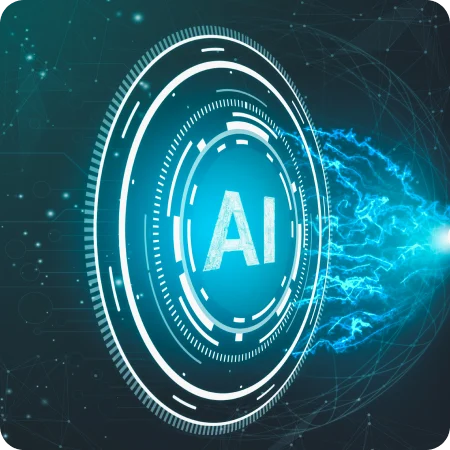
Skills You’ll Gain
Robotic Process Automation (RPA)
AI-Powered Control Systems
Machine Learning for Robotics
Robotic Path Planning
Sensor Integration and Data Processing
What You'll Learn
Module 1: Introduction to Robotics and Artificial Intelligence (AI)
- 1.1 Overview of Robotics: Introduction, History, Evolution, and Impact
- 1.2 Introduction to Artificial Intelligence (AI) in Robotics
- 1.3 Fundamentals of Machine Learning (ML) and Deep Learning
- 1.4 Role of Neural Networks in Robotics
Module 2: Understanding AI and Robotics Mechanics
- 2.1 Components of AI Systems and Robotics
- 2.2 Deep Dive into Sensors, Actuators, and Control Systems
- 2.3 Exploring Machine Learning Algorithms in Robotics
Module 3: Autonomous Systems and Intelligent Agents
- 3.1 Introduction to Autonomous Systems
- 3.2 Building Blocks of Intelligent Agents
- 2.3 Statistical Inference
Module 4: AI and Robotics Development Frameworks
- 3.1 Types of Data
- 3.2 Data Sources
- 3.3 Data Storage Technologies
Module 5: Deep Learning Algorithms in Robotics
- 4.1 Introduction to Python for Data Science
- 4.2 Introduction to R for Data Science
Module 6: Reinforcement Learning in Robotics
- 5.1 Data Imputation Techniques
- 5.2 Handling Outliers and Data Transformation
Module 7: Generative AI for Robotic Creativity
- 6.1 Introduction to EDA
- 6.2 Data Visualization
Module 8: Natural Language Processing (NLP) for Human-Robot Interaction
- 7.1 Introduction to Generative AI Tools
- 7.2 Applications of Generative AI
Module 9: Practical Activities and Use-Cases
- 8.1 Introduction to Supervised Learning Algorithms
- 8.2 Introduction to Unsupervised Learning
- 8.3 Different Algorithms for Clustering
- 8.4 Association Rule Learning with Implementation
Module 10: Emerging Technologies and Innovation in Robotics
- 9.1 Ensemble Learning Techniques
- 9.2 Dimensionality Reduction
- 9.3 Advanced Optimization Techniques
Module 11: Exploring AI with Robotic Process Automation
- 10.1 Introduction to Data-Driven Decision Making
- 10.2 Open Source Tools for Data-Driven Decision Making
- 10.3 Deriving Data-Driven Insights from Sales Dataset
Module 12: AI Ethics, Safety, and Policy
- 11.1 Understanding the Power of Data Storytelling
- 11.2 Identifying Use Cases and Business Relevance
- 11.3 Crafting Compelling Narratives
- 11.4 Visualizing Data for Impact
Module 13: Innovations and Future Trends in AI and Robotics
- 12.1 Project Introduction and Problem Statement
- 12.2 Data Collection and Preparation
- 12.3 Data Analysis and Modeling
- 12.4 Data Storytelling and Presentation
Optional Module: AI Agents for Robotics
- 1. Understanding AI Agents
- 2. Case Studies
- 3. Hands-On Practice with AI Agents
Tools You’ll Master

OpenAI Gym

GreyOrange
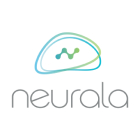
Neurala

Dialogflow
Prerequisites
- Familiarity with basic concepts of Artificial Intelligence (AI), without the need for technical expertise.
- Openness to generate innovative ideas and concepts, leveraging AI tools effectively in the process.
- Ability to analyze information critically and evaluate the implications of AI and Robotics technologies.
- Readiness to engage in problem-solving activities and apply AI techniques to real-world scenario
Exam Details
Duration
90 minutes
Passing Score
70% (35/50)
Format
50 multiple-choice/multiple- response questions
Delivery Method
Online via proctored exam platform (flexible scheduling)
Exam Blueprint:
- Introduction to Robotics and Artificial Intelligence (AI) – 5%
- Understanding AI and Robotics Mechanics – 6%
- Autonomous Systems and Intelligent Agents – 6%
- AI and Robotics Development Frameworks – 9%
- Deep Learning Algorithms in Robotics – 9%
- Reinforcement Learning in Robotics – 9%
- Generative AI for Robotic Creativity – 9%
- Natural Language Processing (NLP) for Human-Robot Interaction – 9%
- Practical Activities and Use-Cases – 8%
- Emerging Technologies and Innovation in Robotics – 9%
- Exploring AI with Robotic Process Automation (RPA) – 9%
- AI Ethics, Safety, and Policy – 6%
- Innovations and Future Trends in AI and Robotics – 6%
Choose the Format That Fits Your Schedule
What’s Included (One-Year Subscription + All Updates):
- High-Quality Videos, E-book (PDF & Audio), and Podcasts
- AI Mentor for Personalized Guidance
- Quizzes, Assessments, and Course Resources
- Online Proctored Exam with One Free Retake
- Comprehensive Exam Study Guide
- Hands-on Labs
Instructor-Led (Live Virtual/Classroom)
- 5 days of intensive training with live demos
- Real-time Q&A and peer collaboration
- Led by AI Certified Trainers and delivered through Authorized Training Partners
Self-Paced Online
- ~30 hours of on-demand video lessons, e-book, podcasts, and interactive labs
- Learn anywhere, anytime, with modular quizzes to track progress
Discover Your Ideal Role-Based Certifications and Programs!
Not sure which certifications to go for? Take our quick assessment to discover the perfect role-based certifications and programs tailored just for you.
Frequently Asked Questions
What is the AI+ Robotics™ Certification about?
- The AI+ Robotics™ Certification provides a comprehensive understanding of the intersection of Artificial Intelligence (AI) and Robotics.
Who should enroll in this certification?
- This certification is ideal for professionals and enthusiasts interested in AI and Robotics, including those with basic familiarity with AI concepts.
What practical skills will I gain from this certification?
- You will gain hands-on experience in building AI models, training neural networks, developing reinforcement learning models.
How will this certification benefit my career?
- This certification will enhance your skills in AI and Robotics, making you a valuable asset in industries adopting automation and AI-driven solutions.
What are the prerequisites for enrolling in the certification?
- Participants should have a basic understanding of AI concepts, be open to generating innovative ideas, have the ability to critically analyze information.

